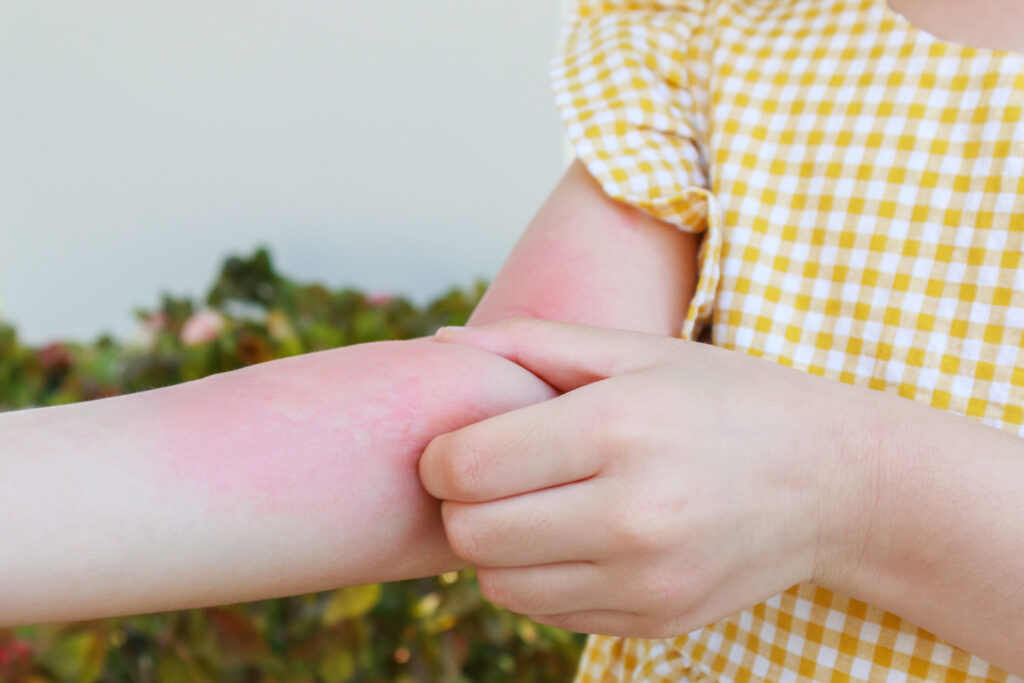Managing Childhood Eczema: What Parents Should Know

According to HealthyChildren.org, at least one in ten children suffers from a skin condition known as atopic dermatitis (also commonly known as eczema). While eczema is not contagious, it can be extremely uncomfortable for children because of the itching it causes.
For children who have been diagnosed with eczema, managing the condition is key. For many, this is done by avoiding common triggers, such as food. While we do not offer testing for food allergies in our office, our team can provide personalized guidance on managing eczema in conjunction with your child’s allergist.
Background on Eczema and Its Relevance in Pediatric Dermatology
Specifically, eczema occurs when children lack a special protein (known as filaggrin) in the outermost layer of the skin. This protein is responsible for building a barrier between the body and the environment, so skin lacking this protein can lead to being more affected by irritants.
While most children begin to outgrow eczema around the age of four, they may suffer from itchy, red rashes across the body. Sometimes, these rashes may be localized around the arms, legs or face. In more severe cases, rashes may spread across most or all of the body.
At Dermatology Associates of Plymouth Meeting, our pediatric dermatologists can diagnose and help treat/manage eczema and other common childhood skin conditions. Our very own Dr. McGuinn and Dr. McGeehin regularly see pediatric patients suffering from atopic dermatitis and are here to help.
The Connection Between Food Allergies and Eczema
While food allergies cannot cause a child to develop eczema, they can trigger flare-ups in children already suffering from this skin condition. In fact, according to a 2022 study, food allergies affect an estimated 30% of children suffering from moderate to severe eczema.
So, how do food allergies trigger eczema flare-ups? When a child consumes food to which they are allergic, this can trigger an immune response in the body. Essentially, allergen-containing food is seen as a foreign matter that needs to be fought off. For some children, this immune response can lead to flare-ups of skin conditions, including eczema, immediately after the food is consumed.
Common Foods That Trigger Eczema in Children
What foods trigger eczema? This can vary from one child to the next, but some of the most common food allergens in children include:
- Dairy (including eggs)
- Nuts
- Soy
- Shellfish
- Wheat
For children who have eczema that seems to get worse after eating certain foods, it’s a good idea to schedule an allergen test. This can help narrow down potentially triggering foods and even foods the child may be sensitive to.
The Importance of Early Diagnosis and Treatment
While many children will grow out of eczema around the age of four, the condition can be extremely uncomfortable for young children and may even affect a child’s sleep. In severe cases, children may even scratch at their eczema rashes until the skin breaks, increasing infection risk. Parents and caregivers can take proactive steps to avoid triggers and minimize flare-ups by identifying signs of eczema and food allergies early on.
At Dermatology Associates of Plymouth Meeting, we provide comprehensive services for evaluating and managing pediatric skin conditions, including eczema. Our in-house treatments and state-of-the-art technologies are fine-tuned for pediatric applications so all children receive the quality care they deserve.
Tips for Parents: How To Monitor and Manage Food-Triggered Eczema
For parents suspecting a food allergy linked to eczema flare-ups, it’s a good idea to consult with a dermatologist at our practice for professional advice and management. Allergy testing is also recommended, as is maintaining a food diary. Keeping a food diary can be a great way to identify potential trigger foods so they can be avoided in the future. Parents should also watch out for other signs of food allergies, such as:
- Hives
- Itching
- Digestive problems
Schedule a Consultation Today
Understanding and managing food triggers for childhood eczema can help to keep your child more comfortable until the condition is outgrown. While there is no cure for eczema, its symptoms can often be managed with a little care and diligence. Likewise, seeking expert care for your child’s eczema or other dermatological needs is always recommended.
If your child is showing signs of eczema or any other skin condition, schedule a consultation with our team at Dermatology Associates of Plymouth Meeting as soon as possible. You can book an appointment online or call our office at (610) 947-4322 to get started.
